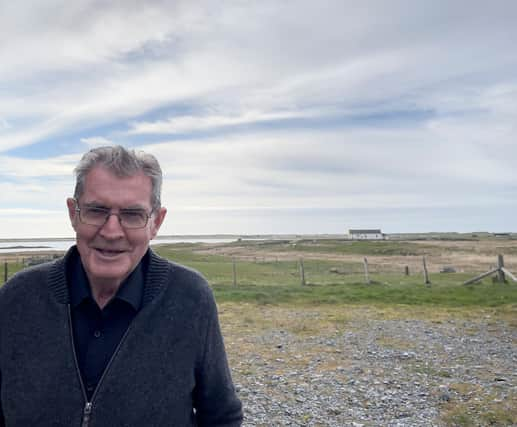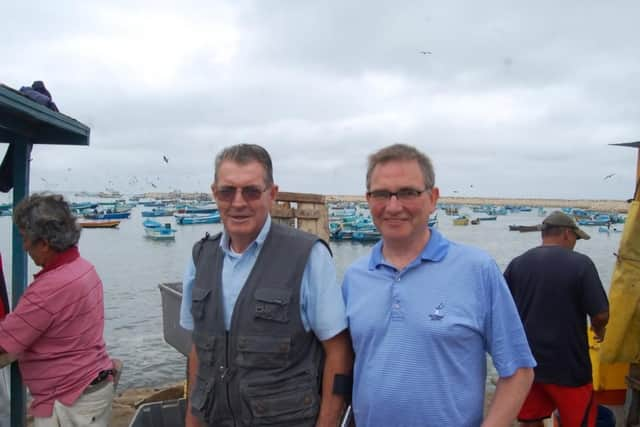Vaccine is right of the world's poor


The problem now is vaccination and Colin’s urgent interest is in ensuring that a lot more of it gets through to the people he lived among and fought countless battles for over more than three decades – the poor of Ecuador.
So the call I received was about putting together a petition to the British Government asking it to earmark some of its surplus vaccine for Ecuador, a country that tends to get overlooked since it is not the poorest even in Latin America and has managed to squander the potential for oil wealth through corruption and mismanagement.
Advertisement
Advertisement
But the poor are very poor and will wait a long time for protection against Covid-19. Meanwhile, the rich fly to Miami and pay to be vaccinated which solves the problem for the country’s elite.

As we draw relief from the success of the UK’s own vaccination programme, it is easy to forget the very different situation which persists elsewhere in the world, in far off lands of which we know little. For most of us, Ecuador fits that description. The exception is Colin MacInnes
From his desk-top in South Uist, Father Colin united an array of distinguished signatories which included Ecuador’s vice-president and head of the armed forces behind a call for Britain to donate surplus vaccine through channels which would ensure that priority is given to the poor.
It is an objective he is still pursuing while maintaining close contact with some of the projects he initiated and in which he remains very actively involved, through the wonders of late night zoom calls to beat the time difference.
Advertisement
Advertisement
Since returning to Uist, Colin has remained in constant touch with Ecuador and his description of last year’s pandemic gives some insight into realities which, he now fears, will repeat themselves without the protection of vaccination.


“Guayaquil, our main port and a city of 2.6 million inhabitants was regarded as the epicentre of the pandemic in South America. The scenes witnessed in April and May of 2020 were Dantesque: dead bodies scattered in the streets, a shortage of body bags, confusion in identifying the dead and a corrupt open market for bags, medicines and face masks.”
While Father Colin’s particular interest is in Ecuador – where only two per cent of the population have been vaccinated - his message could be a metaphor for the whole developing world and its needs at this time.
He says: “Schools have been closed for over a year now. In my last parish I organised schooling for poor kids who had no means of receiving online teaching. I was going to expand the project at the end of this month but without vaccinating the teachers it might not be possible.
Advertisement
Advertisement
“I also have another project for giving elderly people a daily meal. It is very important that there be a vaccination programme whereby those working for the poor receive vaccines”.
He believes that surplus vaccine in Britain and other wealthy countries must not only be distributed but distributed in a way that ensures they reach the poor. In many countries – including Ecuador – that is a vital distinction.
“Are the poor in Ecuador to be left to die? The petition I presented to the British Government is the surest way that there could be of creating a just distribution and to ensure the most vulnerable are attended. It could serve as a model for other countries in the same situation”.
It is unlikely that the British Government will deviate from its support – which is substantial – for the UN-backed international approach to vaccine aid. The very least that Father Colin hopes to achieve is that whenever it arrives, it gets through to the people who need it most.
Advertisement
Advertisement
There is, he says, one other ray of hope. “A newly elected President will be installed next week. He is highly regarded as a man of integrity and a competent business man. Before I left Ecuador I was to form a food bank with his help”.
With anyone else, if they mentioned as an aside that they had been about to found a foodbank with help from the guy who is due to become President of the country, the first response might be scepticism.
That is not the case with Father Colin. The things he has done in Ecuador are extraordinary and there is nobody he does not know. Even though he is working from Bornish and not Quito, a just vaccination programme in a country 6000 miles away does not seem too much to work towards.
I OWE THE first appearance of my writings between hard covers to Father Colin MacInnes. It was back in 1976 and I had reported a football match between North End and the Army which ended in disarray.
Advertisement
Advertisement
The North End team walked off in protest after a soldier butted Colin on the nose, the Army later alleging that his robust style of play was “unbecoming of a man of the cloth”. Colin countered that the Army had got “wilder and wilder” while “my boys were very good – they didn’t retaliate at all”.
This account appeared under the headline “Priest Butted on Nose and Sabbath”. When my friend Ian Archer, a great sports writer, came across it, he included it in an anthology of Scottish football called “We’ll Support You Ever More”. And there it remains for posterity.
Colin carried the same leadership qualities into the priesthood. Wherever he went, he made things happen. In Iochdar, he threw himself into the co-chomunn movement and led the building of a hall. On Barra, alarmed by the fragility of Gaelic language and culture, he was central to the birth of Feis Bharraigh, and hence the whole Feisean movement. And so it went on.
And then in 1985, it was all change at least in some respects. Through an American mission society, he was sent to Ecuador and a suburb of Quito called Comite del Pueblo which was a long way from Iochdar in every respect. As Colin set about implementing his projects in the interests of the poor, he found himself in conflict with the local mafia, albeit one dressed up as communists who ran Comite del Pueblo.
Advertisement
Advertisement
My vague awareness of all this took a sharp leap forward one night in 1996 when I was asked to phone Colin under conditions of great secrecy. He was in hiding having fled, quite literally, for his life after standing up to the thugs once too often for his own safety, if not for his perpetual sense of social justice.
As an MP at the time, I made the Foreign Office aware, asked questions in Parliament and generally contributed to the noise which eventually led to his safe release. The episode raised his profile in Ecuador where he acquired – and retains – a national reputation as champion of the poor, a counterpoise to corruption and also as a man who – just as in Iochdar and Northbay almost half a century ago – leads by practical example.
Comite del Pueblo, he says, is now a prosperous suburb of Quito, transformed from its previous thralldom. His next parish was in Guayaqil and then the fishing port of Salinas. In 2014, my son and I visited him in Salinas and we stopped off at his previous parish for an unannounced visit. The spontaneous welcome he received was emotional even to observe. Of course, he had built a health centre there.
Salinas did not have the same problems of poverty but he went back to his roots by forming a fishermen’s co-operative to try to maximise the value of the catch. Some issues are the same the world over.
Advertisement
Advertisement
For health reasons, he returned to the Diocese of Argyll and the Isles in 2017, as parish priest in Benbecula. A lot had changed in 32 years and it was not an easy transition. Last year, he spent several weeks in hospital in Glasgow and underwent five operations for hip replacement. Maybe it was these old football injuries.
Last month, he retired and is now living in Bornish, his native village. But at least part of him is still with the poor of Ecuador and each evening, he reconnects with the projects he initiated, the people devoted to him, the campaigns he pursues – which currently means the struggle to ensure that vaccines are for the poor as well as the wealthy.